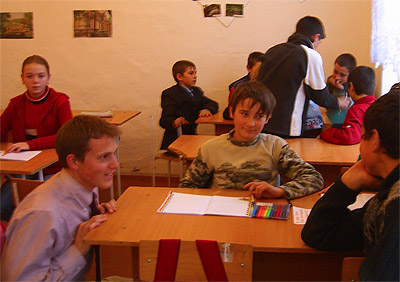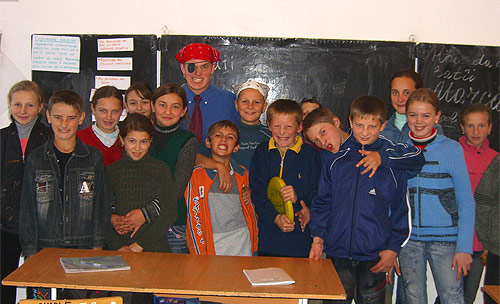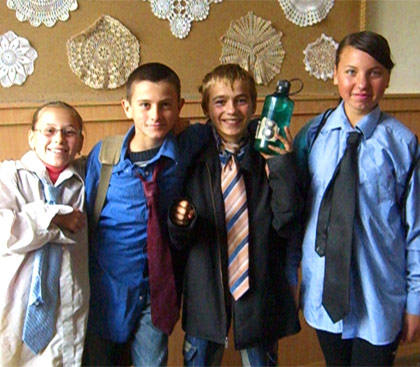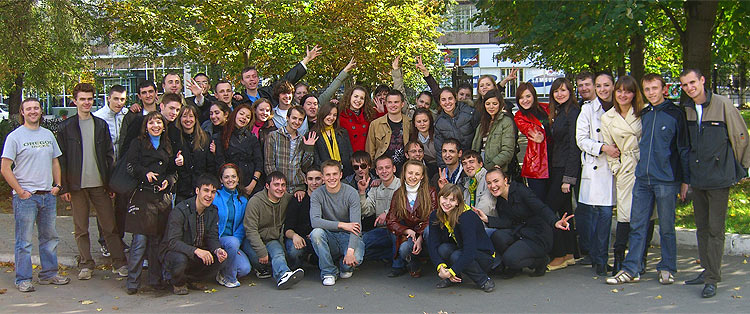 |
 |
 |
|
|
 |
 |
 |

The Unknown Road
Sometimes the hardest step for an elite runner is the next one
by Matt McCue
What's the next step after a runner finishes competing for his team? A star from the University of Colorado recently faced that question. One path offered the life of a professional runner, his dream. The other promised sweet peace, the chance to join the Peace Corps, something he had never been able to do because of the sacrifices he made for his sport. Which would he travel?
 Distance runners are no strangers to cold, dark mornings. Erik Heinonen, a 2006 NCAA Division I cross country All-American, has been waking and rising before the sun for years. That's what it takes when you grow up harboring dreams to compete in the Olympic Trials. So, it's no surprise that Heinonen, now 26, wakes at 6:30 A.M. these days. When his phone alarm vibrates right next to his pillow, he rolls out of bed—in his case a tiny futon. Per his ritual, he listens to NPR podcasts on his iPod while he completes a set of core exercises meant to alleviate the pain of a herniated disk in his back. Erik resides in a brightly-painted green grass-colored concrete-block house lost within a remote village more than a 90-minute drive from the "city." It sounds a bit Quenton Cassidy-ish except for one missing detail: the trials of miles. Instead of slipping his feet into well-worn Nike's, Erik slides them into a $3 pair of tried-and-true slippers flecked with bits of mud. He tiptoes past the bedrooms of the two high-school girls who also board at the home of his host family. They all think he's insane for what he's going to do. Distance runners are no strangers to cold, dark mornings. Erik Heinonen, a 2006 NCAA Division I cross country All-American, has been waking and rising before the sun for years. That's what it takes when you grow up harboring dreams to compete in the Olympic Trials. So, it's no surprise that Heinonen, now 26, wakes at 6:30 A.M. these days. When his phone alarm vibrates right next to his pillow, he rolls out of bed—in his case a tiny futon. Per his ritual, he listens to NPR podcasts on his iPod while he completes a set of core exercises meant to alleviate the pain of a herniated disk in his back. Erik resides in a brightly-painted green grass-colored concrete-block house lost within a remote village more than a 90-minute drive from the "city." It sounds a bit Quenton Cassidy-ish except for one missing detail: the trials of miles. Instead of slipping his feet into well-worn Nike's, Erik slides them into a $3 pair of tried-and-true slippers flecked with bits of mud. He tiptoes past the bedrooms of the two high-school girls who also board at the home of his host family. They all think he's insane for what he's going to do.
Maybe he is?
The setting isn't a hideaway in rural Oregon or a mountain retreat high above Boulder. It's Moldova, an Eastern European country where Erik is stationed as a Peace Corps volunteer. His temporary living quarters lack indoor plumbing, a working refrigerator, and...gasp!...a TV. He does, however, have an Internet connection. His primarily link to home was recently installed through the phone line for his laptop. Over the past 20 months, Erik has learned to live with less, a life that he describes as "kind of like camping" for two years straight.
When Erik leaves he gently pushes the back door open and walks down a short dirt path past stacks of wicker baskets, barrels for wine making, and chopped firewood. His destination? The home's one source of running water: a faucet near the pig pen. When asked where that is, Erik says it's next to where the chickens are kept. There is mud all around, deep, squishy, and sticky—like brown glue. It can turn each step on the walk to town into a burdensome chore.
As long as the spigot isn't frozen he's got some flowing water. Many local families must draw from a well. Erik will fill his blue plastic bucket halfway and walk back up the dirt path to the outdoor "shower." It's three pieces of metal roofing nailed together and laid vertically upon wooden slats—the floor. He'll kick off his slippers and either stand on the slats or, if a fresh layer of snow blankets the ground, on the slushy film. He'll grab his plastic mug hanging from the wall and chip away any ice stuck inside the cup before dipping it into the bucket of cold water…and pouring it over his exposed skin. Veiled by a black curtain, the town is just rising and, Erik, the American, is bathing. It's not really a moment he looks forward to, but it sometimes gets to the point where he thinks, "It's been three days. I'm disgusting. I need to shower." Yeah, he'd rather sleep in an extra 15 minutes. Hell, he'd rather be running—that's what he knows. But he can't for the time being. The coldest it's been? One morning the temperature was –10 Celsius. That's 14 degrees Fahrenheit! On that day, Erik's feet almost froze to the ground.
Froze. To. The. Ground.
"Kind of like when the other kids dared to you lick the frozen flagpole outside school," Erik says, laughing.
A Life-Changing Detour
The son of Tom, the University of Oregon's longtime distance coach, and Janet, a running columnist and author, Erik was born in Eugene and lived six-blocks from Pre's track. A skinny junior high basketball and football player, Erik quickly discovered his greatest strength was simply outlasting others. His pedigree along with his natural inclination to dominate team-sport conditioning drills led him to cross country and track. Tenacious training awarded him a fifth-place finish—behind Ritz, Webb, and Hall—at the 2000 Footlocker championships. He went to the University of Oregon before transferring to the University of Colorado and finishing his scholastic career as a difference-making member of their 2006 national championship cross country team. His passion, work ethic, and roots all pointed towards one quest: professional runner. So, it was a major surprise when, upon graduation, he passed on the chance to compete for the Brooks-sponsored Hanson team in Michigan. Instead, he volunteered for the Peace Corps. The organization sent him far away to Moldova, a tiny landlocked country wedged between Romania and Ukraine. Don't worry if you've never heard of it. Neither had Erik, a well-read journalism major. Claiming a population of 4.3 million, Moldova's people are considered the poorest in Europe. On average, they live on $4 per day.
As Erik approaches the end of his two-year term this August, he isn't looking back on what might have been. His new life has given him a fresh perspective. Says Erik, "After having spent the better part of ten years pretty single-mindedly pursuing my running, which demands a high-level of selfishness in the sense that every decision you make goes through the 'How-will-this-affect-my-next-workout filter?' I felt like I was ready to spend two years doing my best to serve other people."
A Fresh Perspective
 Measuring five-feet-ten in boots, Erik is blessed with a wiry frame. His thin, muscular calves have been carved from the discipline to spend long hours on roads, trails, and tracks. His Scandinavian features, blond hair and green eyes, quickly out him as a foreigner in the former Soviet Union republic where the majority of the population is ethnically Romanian. A health teacher who also oversees the after-school programs, he works longer hours than his contemporaries in the U.S. His village's one school building, with only 15 classrooms, is too small to house all 500 students at once. The 1st and 7th –12th graders take the early shift from eight in the morning until one in the afternoon. They go home and Erik breaks for lunch before the 2nd –6th graders fill their seats from 1:30 to 6:00. The schedule doesn't allow much free time for Erik to indulge in a run, but, unfortunately, that's a moot point these days. Erik explains: "I tore a disk in my back last spring. I'm not even sure how or when it happened. I thought it was a stress fracture at the time, because I had had one in the same area a few years ago. It turned out to be a disk, and I basically have to wait it out, until I get back to the States and can start working with a physical therapist. I'm on month nine of no running and have pretty much resigned myself to the fact that I won't be able to get back at it until August at the earliest." Measuring five-feet-ten in boots, Erik is blessed with a wiry frame. His thin, muscular calves have been carved from the discipline to spend long hours on roads, trails, and tracks. His Scandinavian features, blond hair and green eyes, quickly out him as a foreigner in the former Soviet Union republic where the majority of the population is ethnically Romanian. A health teacher who also oversees the after-school programs, he works longer hours than his contemporaries in the U.S. His village's one school building, with only 15 classrooms, is too small to house all 500 students at once. The 1st and 7th –12th graders take the early shift from eight in the morning until one in the afternoon. They go home and Erik breaks for lunch before the 2nd –6th graders fill their seats from 1:30 to 6:00. The schedule doesn't allow much free time for Erik to indulge in a run, but, unfortunately, that's a moot point these days. Erik explains: "I tore a disk in my back last spring. I'm not even sure how or when it happened. I thought it was a stress fracture at the time, because I had had one in the same area a few years ago. It turned out to be a disk, and I basically have to wait it out, until I get back to the States and can start working with a physical therapist. I'm on month nine of no running and have pretty much resigned myself to the fact that I won't be able to get back at it until August at the earliest."
For a self-disciplined guy who once saw taking a day off as akin to a sin, the months without running have numbed his mind.
"It was definitely harder at the beginning," Erik says of the injury, "but, fortunately, I'm so busy and I'm doing things that I feel good about. It's not as bad as I thought it would be, but it is scary to get used to the fact that I'm just not running. I don't like that and when I think about it I get upset, but after a while you just get used to the fact that it's not a part of your day and you go about your business. I'd rather be hurt here even though I can't get any help because with that time and energy I can be doing other things. I can do a lot more."
Once a Runner, Always a Runner
The reality is that once a person has taken that tough first step they will always be a runner even if their weekly mileage decreases or drops to zero. Running teaches life lessons and Erik is applying them to the challenges he faces in Moldova.
|
| Erik Heinonen gives a tour of the space where he hopes to help construct a sports complex for the school where he teaches.
|
"It's been pretty encouraging to see how certain things have carried over here even if they're pretty general lessons," he says. "Obviously, as a runner, if you want to be any good, you figure out how to work hard every day, that it's not so much the heroic track workouts or long runs that make you good. It’s all the normal days that you keep stringing together. The same thing applies here. I work hard from morning 'til I go to bed pretty much every day, and I’ve gotten really good results as far as my teaching. I’ve managed to learn Romanian, the language I teach in…and with all the other projects I’ve done or have going…” Stop right there. What he means by "other projects" is that he's leading a group of community leaders and students to fund and build a sports complex for his school. It will consist of a paved basketball and volleyball court, gymnastics equipment, a mini grass soccer field, and small running track. In case you were wondering, yes, a high fence will also be erected to guard it from grazing animals. "They tore down the school gym in 1991 to make room for a school expansion, but the money disappeared and they ended up without a gym and without the annex," says Erik. "We make do with what we have, but it's not much: A dirt and grass field when the weather is good, and a cramped room in the basement when the field gets too muddy or is covered in snow."
By involving community members, Erik and his committee hope to create a sense of collective ownership, ensuring the proper use and care of the facility in the years to come. In all, says Erik, the village's contribution will cover at least 40 percent of the project's total costs of approximately $8,000. Erik needs to come up with $5,000. To raise his share, Erik has reached out to friends and family. Several members of a third-grade class from Eugene have donated Christmas and Hanukah money, and are organizing a mini jog-a-thon. The Girl Scout troop to which the daughter of 1992 Olympian Annette Peters belongs has done a pop-can drive. His sister is selling fruit from the trees in her front yard and sending the dollars along. Grassroots efforts like these have brought in half of the funds, leaving $2,500 to go. He needs to obtain the balance by March 20th, so construction can commence on April 1st and be finished before he leaves Moldova in August. Following the "every-dollar-counts spirit" of Obama's presidential campaign, Erik's next step will be to collect lots of incremental amounts, $10 here and $15 there.
A picture of everyone who gives to the project will be included in a large collage that will grace the wall of the school.
Erik, who has also organized ecology campaigns, health seminars, field-days, and secondhand toy and clothing drives in his village, is the first to acknowledge that it's a heady task. "This is the first time I've ever done anything this big, so I think my expectations were a little too high as far as what was going to happen." And yet that's the beauty of it. He's young and inspired and he's trying to make a difference. Thus far he's committed more than 200 hours of sweat of equity to the project. That includes writing two articles for newspapers in Eugene and Boulder, scouting other facilities to see what is available, formulating a budget, completing the grant proposal to Peace Corps, taking photos, making videos, leading meetings, and writing emails to everyone under the sun. "If you count worrying and fretting time," adds Erik, chuckling, "I'm probably at 1,000 hours."
In the same way that a fifth runner busts his butt for the good of his cross country team, Erik sees his role as contributing to something bigger than himself. "Life can be incredibly hard here for a lot of the population, especially kids," he says, "The poverty rate is still really high as the country tries to get things figured out coming out of the Soviet era, and with more than a quarter of the population working abroad because of the lack of jobs here, the number of kids growing up without one or both parents just breaks your heart. Many of them will go four, five years or even more years at a time and only see their parents once or twice. The kids here are really brave to face what many of them do every day, and you can't help but want to do anything you can to encourage them and to give them more reasons to smile.”
"It's going to be really hard to leave. I get emotional just thinking about it. But when that day comes, I want to walk away, like we all do from a race, knowing I gave them as much as I could, that I 'left it on the course,' like we say in running. Getting the sports complex we're working on at the moment would go a long way towards that, and be a way of helping thank the community for all the joy and amazing moments they've given to me."
Looking Back
From 2004-2005, Erik, who was granted a 6th year of eligibility because of three cross country seasons missed due to injuries, and I were teammates at the University of Colorado. While much has been told about the mythical and mountainous Magnolia Road, less is known about the easy days spent running around the flat grass perimeter of Kitt Field. As the team's young guns—Billy Nelson, Brent Vaughn, and Stephen Pifer, among others—yearned for more up-tempo easy days, Erik and I, the elder statesmen, recovered by plodding around the 800-meter loop for no less than ten miles—the shortest distance we could bear.
 We talked of politics and literature, of workouts on the horizon and whatever highlight we had seen on Sports Center. We joked about how college girls weren't interested in dating guys like us who didn't drink and flipped off the lights at 10 on Saturday nights in order to run 18 miles the following morning. And, as we neared the end of college, we asked ourselves the humbling and harrowing question that had slowly been sneaking up: What is life like after ten years of running with a team? We talked of politics and literature, of workouts on the horizon and whatever highlight we had seen on Sports Center. We joked about how college girls weren't interested in dating guys like us who didn't drink and flipped off the lights at 10 on Saturday nights in order to run 18 miles the following morning. And, as we neared the end of college, we asked ourselves the humbling and harrowing question that had slowly been sneaking up: What is life like after ten years of running with a team?
For Billy, Brent, and Stephen, and my former roommates Jorge, Ed, and Dathan, the choice was clear. Sign with a shoe company and go pro. While Erik and I loved competing as much as those guys, we just weren't as fast despite our effort. Perhaps, we could live like hermits for the next 8-12 years, run like hell, overcome the odds, and clinch a spot on the Olympic marathon team like Brian Sell. Perhaps, but unlikely, no matter how bad we wanted it. It was on those easy runs at Kitt when Erik first let on that he might join the Peace Corps. Yeah, I said, go for it. The decision to move halfway across the globe to a land where he had never been and didn't know anyone told me as much about Erik's character as the way he hammered milers at the Buff Ranch.
A few weeks ago Erik and I talked on Skype. It was nine in the morning in New York where I am scraping by as an aspiring journalist and four in the afternoon in Moldova. He made me cringe when, pressed for details, he explained about the unenviable bucket showers. After we tossed around a few ideas on how to solicit more donations for the track, Erik told me he was applying to journalism grad school. Leaning towards science and health-related topics, he dreams of working for NPR. When a slight gap opened in the conversation I nudged Erik: Given what he knows now, does he have any regret about pursuing the Peace Corps rather than the life of a professional runner?
"Not really," he said, "I certainly would love to have knocked my PRs down to where I think they ought to be, and to maybe someday have had a shot at making a US cross or world championships marathon team. But realistically, given my injury history and the level of training that would have been necessary to get there, I probably would have spent a good portion of my time hurt. I would have had a hard time justifying what I was doing to myself. Being here now, having the opportunity to do what I do every day, I can't imagine having made any other decision. I have an absolutely amazing job, and I adore the kids I teach. I may have sacrificed any serious running goals I had by coming here, but I’m okay with it.”
He continued, "I say it all the time that I can't imagine having done anything in the States during the last two years in which I would have grown and learned as much as I have. It was always in me; I just needed the chance to try. I always wondered whether the passion I had for running would transfer to other things. You definitely see athletes, whether they are football players or runners, who have a hard time moving on when they get near the end of their careers. I was never really worried, but it's been pleasantly surprising to find out how much I love teaching, and all the other things I do here. And it's not all fun. It's hard sometimes, but I will definitely treasure the relationships and memories I've made here for the rest of my life. I know I will be able to bring a lot of the things I've learned with me as I go forward from here."
Ah, Forward…moving that direction is the focus of every distance runner. We're always looking ahead and chasing the next competitor in front of us. Rightfully so. Coaches warn us to never look over our shoulder during a race, so we discipline ourselves to never look back. However, if Erik breaks that “sacred” rule and sneaks a peek on the day when he leave his quaint village in Moldova, my guess, given Erik’s mettle to see the project through, is that he'll see a sight that makes him equally as proud as any PR. The field of dreams built on his watch will give future generations of kids and teenagers a track to circle long after he, you, and I have stopped running.
If you would be interested in helping, either contact Erik directly at or go to this link to make a donation.
PS: Anything helps, so if you've got five bucks you can spare, that's two buckets of paint, or several feet of chain-link fence, or a couple kilograms of grass seed!

|
|
|
|
|
|
 |
 |